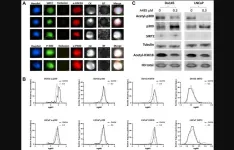NIH researcher Rafael de Cabo, PhD receives AFAR 2023 Irving S. Wright Award of Distinction
2023-07-24
(Press-News.org)
The American Federation for Aging Research (AFAR), a national non-profit organization whose mission is to support and advance healthy aging through biomedical research, is pleased to recognize the exemplary contributions of Rafael de Cabo, PhD, to the field of aging research through the 2023 Irving S. Wright Award of Distinction.
This award is named in honor of AFAR’s founder and recognizes exceptional contributions to basic or clinical research in the field of aging. Established in 1982, the award is a framed citation and carries a cash prize of $5,000.
Dr. de Cabo is Senior Investigator of the Experimental Gerontology Section and Chief of the Translational Gerontology Branch at the National Institute on Aging (NIA) of the National Institutes of Health (NIH). His research has focused on improving our understanding of the molecular mechanisms underlying the effects of caloric restriction on aging and pharmacological interventions for healthy aging. In addition to his several important discoveries, one of the most relevant aspects of his research is the focus on the prevention of age-related functional decline. His work on calorie restriction in mice and his key involvement in the integration of two nonhuman primate projects are providing unique datasets to query and learn from for years to come. Equally impactful are Dr. de Cabo’s contributions in the development of interventions to enhance healthy aging; his research on age-targeting therapeutics is paving the way for translation into the clinic. In addition to authoring or co-authoring 320 publications to date, he is Deputy Editor-in-Chief of The Journal of Gerontology Biological Sciences, serves on the editorial boards of Aging Cell, BBA-Molecular Mechanisms of Disease, Aging Research Reviews, Longevity & Healthspan, Impact Aging, and AGE, and is one of the founding editors of Microbial Cell. Dr. de Cabo received AFAR’s 2014 Vincent Cristofalo Rising Star Award in Aging Research.
“Across his research career, Dr. de Cabo has been a leader in translating our understanding of fundamental processes of aging into lifestyle interventions and drug therapeutics to extend healthspan,” notes Stephanie Lederman, EdM, Executive Director, AFAR. “A valued collaborator and trusted expert, he carries on the visionary commitment of AFAR’s founder to advancing research that will help us all live healthier, longer.”
The Irving S. Wright Award is one of AFAR’s three annual Scientific Awards of Distinction, in addition to the Vincent Cristofalo Rising Star Award in Aging Research and the Terrie Fox Wetle Rising Star Award in Health Services and Aging Research. Nominations for the awards are judged by a panel of leading aging researchers. To date, AFAR has presented 44 Wright Awards,16 Cristofalo Awards, and 4 Wetle Awards.
Dr. de Cabo will receive the Wright Award at the Annual Scientific Meeting of the Gerontological Society of America in November 2023, where he also will present a lecture on his research.
###
About AFAR The American Federation for Aging Research (AFAR) is a national non-profit organization that supports and advances pioneering biomedical research that is revolutionizing how we live healthier and longer. For more than four decades, AFAR has served as the field’s talent incubator, providing more than $193 million to nearly 4,350 investigators at premier research institutions nationwide. A trusted leader and strategist, AFAR also works with public and private funders to steer high quality grant programs and interdisciplinary research networks. AFAR-funded researchers are finding that modifying basic cellular processes can delay—or even prevent—many chronic diseases, often at the same time. They are discovering that it is never too late—or too early—to improve health. This groundbreaking science is paving the way for innovative new therapies that promise to improve and extend our quality of life—at any age. Learn more at www.afar.org.
END
ELSE PRESS RELEASES FROM THIS DATE:
2023-07-24
Could muscadine wine help perk up sagging skin? According to a new study, women who drank two glasses of dealcoholized muscadine wine daily showed significant improvements in the elasticity and water retention of their skin compared with those who consumed a placebo.
The study is the first time scientists have studied the impacts of nonalcoholic wine consumption on skin health in a randomized clinical trial. Researchers attribute the beneficial effects to chemical compounds called polyphenols that naturally occur in many plants.
“Muscadine grapes have been found to have a unique polyphenolic profile in comparison to other red wine varieties,” ...
2023-07-24
While the incidence of influenza-associated neuropsychiatric events in children in the United States is unknown, the controversy over the use of a common antiviral medication typically administered to treat flu in children has sparked concern among parents and medical professionals alike.
The dilemma about whether the treatment causes neuropsychiatric events or if the infection itself is the culprit, led a group of pediatric researchers at Monroe Carell Jr. Children’s Hospital at Vanderbilt to study the question.
“Population-Based ...
2023-07-24
Broken bones in later life are a leading cause of disability, recurrent fracture, nursing home placement, and death.
Prior studies have shown that health care providers can prevent poor outcomes, including death, by treating patients with bone-strengthening medications and by stopping risky medications that cause falls. However, few patients receive this high-quality care because it is time consuming and requires specialized knowledge that primary care providers may not have.
Researchers from Hebrew SeniorLife and Duke University will undertake a 5.5-year study that will compare two care models that have previously ...
2023-07-24
“The results from this initial cohort support the integration of these biomarkers into prospective clinical trials.”
BUFFALO, NY- July 24, 2023 – A new research paper was published in Oncotarget's Volume 14 on July 20, 2023, entitled, “Development of a multiplex assay to assess activated p300/CBP in circulating prostate tumor cells.”
Reduced SIRT2 deacetylation and increased p300 acetylation activity leads to a concerted mechanism of hyperacetylation at specific histone lysine sites (H3K9, H3K14, and H3K18) in castration-resistant ...
2023-07-24
A gene called Myc (pronounced “mick”) that is among the most important drivers of cancer in both mice and humans also plays a newly discovered crucial role in aging, according to a new Cell Reports study by researchers at UPMC Children’s Hospital of Pittsburgh and the University of Pittsburgh School of Medicine.
The research, led by Edward V. Prochownik, M.D., Ph.D., the Paul C. Gaffney Professor of Pediatrics in the Division of Hematology/Oncology at UPMC Children’s and professor in the Department of Microbiology and Molecular Genetics, has implications for newer forms of cancer therapy.
Myc has traditionally been ...
2023-07-24
BINGHAMTON, N.Y. -- Ballet training centers of Ukraine successfully resist co-optation by both neo-imperial and nationalist ideologies, forming robust and inclusive dancing communities that in many ways mirror structures of modern Ukrainian society, according to research from Binghamton University, State University of New York.
The signature Vaganova style of Soviet ballet can be described in a number of ways: exacting, athletic, classical, Russian. It’s also uniform across post-Soviet training academies, including those based in now-independent Ukraine.
Training shapes bodies, and post-Soviet dancers still begin ...
2023-07-24
A new study by researchers at Case Western Reserve University revealed that the progression of Alzheimer's disease (AD) can be slowed by suppressing a specific protein in the brain that causes corrosion.
A main pathogenic initiator of AD and related dementias is oxidative stress, which corrodes the brain, called oxidative damage.
David E. Kang, the Howard T. Karsner Professor in Pathology at the Case Western Reserve School of Medicine and the study’s lead researcher, said they’ve identified for the first time a cause ...
2023-07-24
Restoring and improving gut health may be key to slowing HIV progression to AIDS, according to a new study by University of Pittsburgh infectious diseases scientists published today in the journal JCI Insight.
The animal study, which was performed with simian immunodeficiency virus (SIV), the monkey form of HIV, revealed that tackling only systemic immune activation and inflammation when attempting to control disease progression and comorbidities isn’t effective. Instead, treatments should target the root cause of those problems and focus on healing the gut.
“It ...
2023-07-24
ROSEVILLE, CALIF. – July 24, 2023 – A pair of new studies presented as abstracts today at the American Society of Nutrition (ASN) annual meeting report that daily prune consumption has promising effects on several biomarkers related to cardiovascular health. Conducted in postmenopausal women and men 55 years and older, the studies reveal:
In men, long-term prune consumption improved HDL cholesterol and the total cholesterol to HDL ratio, while decreasing oxidative stress and the inflammatory biomarker C-reactive protein ...
2023-07-24
Excess heat from electronic or mechanical devices is a sign or cause of inefficient performance. In many cases, embedded sensors to monitor the flow of heat could help engineers alter device behavior or designs to improve their efficiency. For the first time, researchers exploit a novel thermoelectric phenomenon to build a thin sensor that can visualize heat flow in real time. The sensor could be built deep inside devices where other kinds of sensors are impractical. It is also quick, cheap and easy to manufacture using well-established methods.
According ...
LAST 30 PRESS RELEASES:
[Press-News.org] NIH researcher Rafael de Cabo, PhD receives AFAR 2023 Irving S. Wright Award of Distinction








